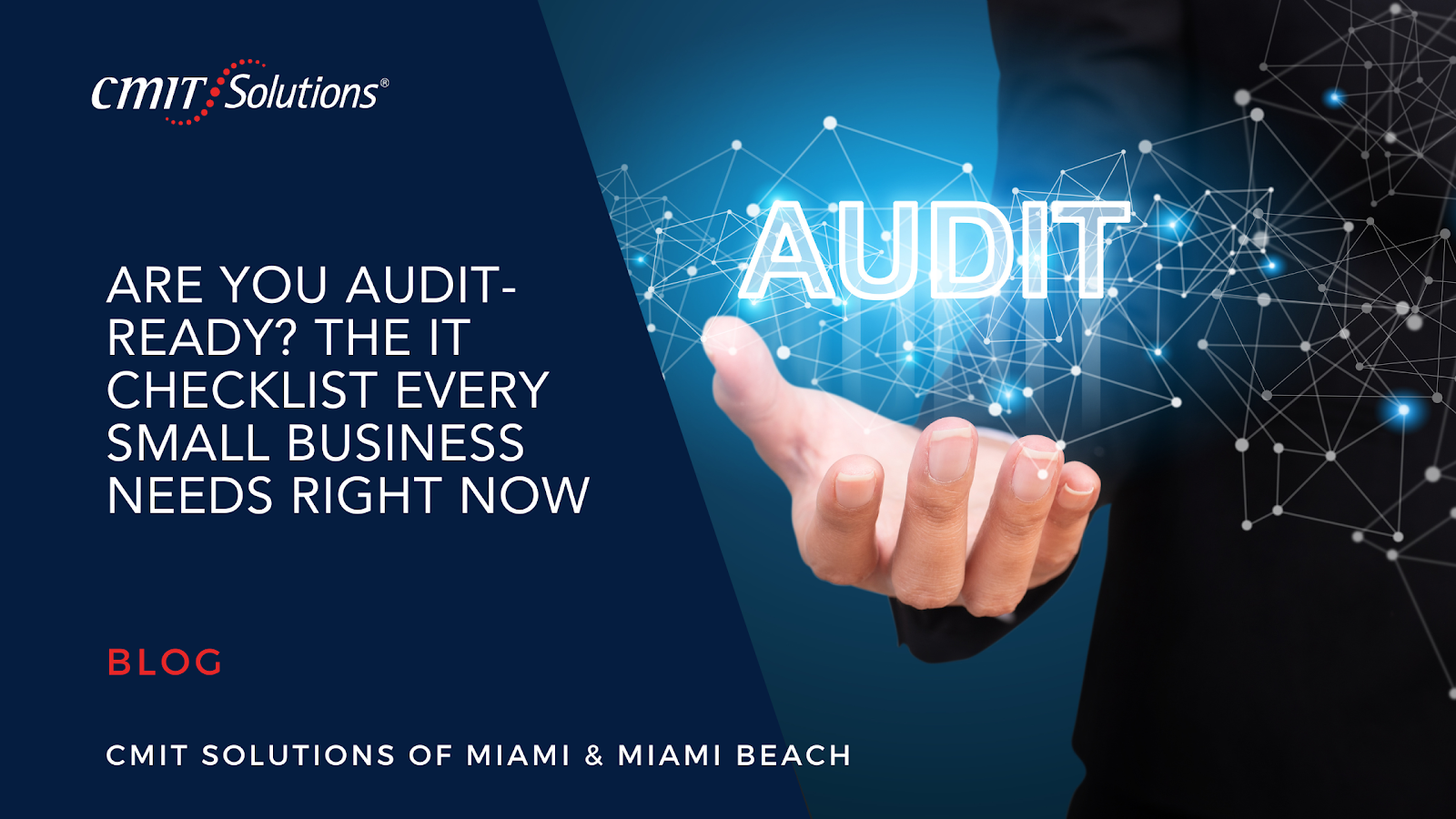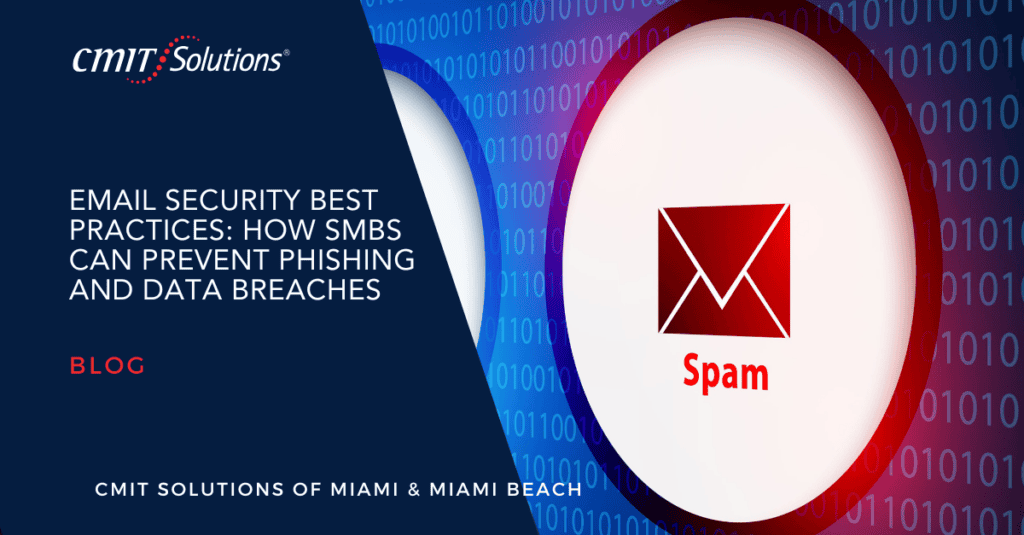Introduction: Why Audit Readiness Matters Now More Than Ever
For small businesses in Miami, IT audits aren’t just about ticking compliance boxes. They are critical moments that test the strength of your infrastructure, the efficiency of your processes, and the safety of your data. In an increasingly regulated, cloud-reliant, and cyber-vulnerable world, audit readiness can mean the difference between business continuity and disruption.
At CMIT Solutions of Miami, we’ve seen how lack of preparation can expose businesses to fines, downtime, and data loss. With the right IT checklist in hand, your business can shift from reactive to proactive, ensuring you’re always ready for audits—whether from clients, partners, or regulatory agencies.
1. Cybersecurity Measures
A secure IT environment is the foundation of audit readiness. You must be able to show evidence of firewalls, antivirus tools, encryption protocols, and identity access controls.
If your organization hasn’t already implemented layered defenses, our guide to multi-layered cybersecurity offers a comprehensive roadmap.
Also, review your digital defenses, ensuring you have endpoint protection and breach response protocols in place.
2. Backup and Recovery
Auditors will want to see that your business can bounce back from a system failure or cyberattack. That means demonstrating both data backup frequency and disaster recovery capability.
Explore our insights on disaster recovery and how to choose the right backup solution. Your audit checklist should include:
- Off-site and cloud backups
- Regular testing of backup systems
- Documented recovery procedures
3. Compliance Documentation
Whether you’re navigating HIPAA, PCI-DSS, or Florida-specific data laws, audit readiness requires documentation. This includes privacy policies, consent forms, security awareness training logs, and vendor contracts.
We break down how to align your operations with compliance in our article on small business regulations.
Ensure you also follow local guidance, such as those highlighted in Miami-based compliance standards.
4. Access Control Policies
Your audit checklist should address who has access to what data and when. A lack of defined identity management practices can lead to non-compliance and security breaches.
Key areas include:
- Role-based access controls
- Audit trails and logs
- Multifactor authentication (MFA)
- Employee onboarding and offboarding protocols
5. Email and Endpoint Security
Cyberattacks often begin with email phishing or compromised devices. Make sure your business employs email filters, antivirus software, mobile device management, and real-time endpoint monitoring.
We offer proven strategies in our blogs on email security and advanced endpoint solutions.
6. Managed IT Services Support
Outsourcing IT functions to a trusted provider like CMIT Solutions of Miami can streamline audit prep significantly. From regular system monitoring to patch management, a managed IT services provider ensures that your infrastructure is always aligned with best practices.
A partner can also centralize documentation, improve response time, and provide audit-specific reporting tools.
7. Cloud Configuration and Visibility
Cloud platforms are audit magnets. Auditors expect businesses to have visibility into their cloud usage, security, and vendor compliance. Our resource on cloud services explains how to secure and optimize your cloud ecosystem.
8. Downtime and Continuity Planning
Show your auditors that your business won’t grind to a halt due to IT failure. This means developing a continuity plan that covers systems, staff, and customer communication.
Learn more about downtime prevention and the continuity strategies that keep operations moving.
9. Staff Training and Awareness
Compliance is a team effort. Employees must be trained to handle data securely, recognize phishing attempts, and follow IT protocols. This is a frequently overlooked audit area.
Explore how cybersecurity training enhances readiness and mitigates risk.
10. IT Strategy and Growth Alignment
Audits don’t just examine where you are today—they evaluate your future readiness. Is your IT strategy designed to scale? Are your systems adaptable to new compliance rules and digital risks?
Find out how strategic IT growth aligns with audit excellence.
Advantages and Disadvantages of Audit Preparation
Advantages:
- Improved Security Posture: Proactively identifying and closing vulnerabilities lowers risk.
- Compliance Confidence: You’re always ready for regulatory checks, reducing the chance of penalties.
- Business Continuity: Strong IT policies ensure rapid recovery from failures.
- Client Trust: Demonstrates commitment to data security, attracting more partnerships.
- Competitive Edge: Being audit-ready can set you apart in RFPs and client negotiations.
Disadvantages:
- Time Intensive: Gathering documentation and training staff can consume resources.
- Cost Implications: Investing in audits, training, and security tools may strain smaller budgets.
- Complexity: Navigating multiple compliance standards (HIPAA, PCI, etc.) can be challenging without expert support.
- Change Management: Introducing new protocols may initially disrupt workflows.
Conclusion: Audit Confidence Starts with Preparation
Being audit-ready isn’t just a check-the-box exercise. It’s a mindset and an ongoing commitment to secure, compliant, and well-managed technology. The checklist above is your blueprint for preparation—but you don’t have to do it alone.
At CMIT Solutions of Miami, we help businesses build resilient, audit-ready environments that reduce risk, save time, and increase trust. Whether it’s compliance, backup, or endpoint protection, we’re ready to support your journey to audit confidence.






